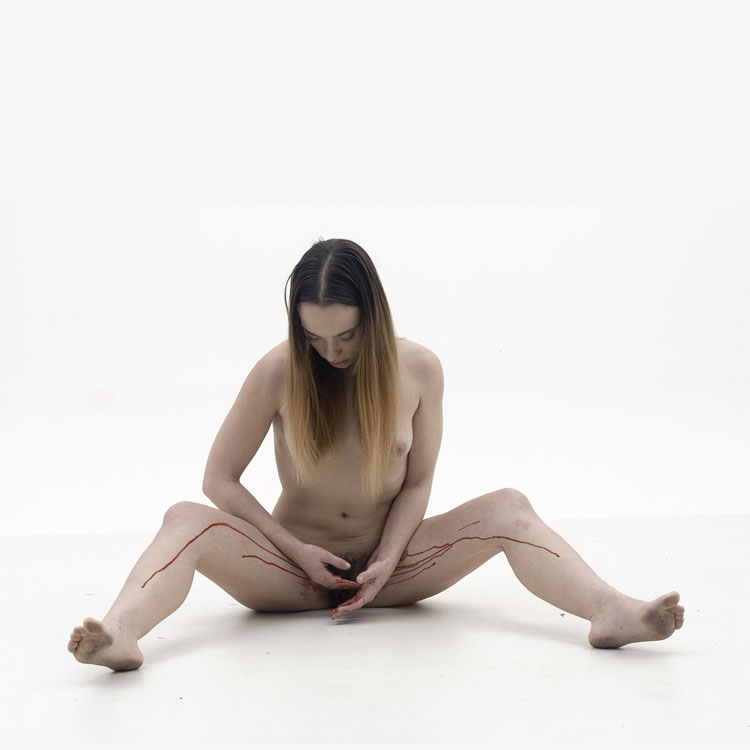If you create or own art
concerning menstruation or menopause and are
interested in showing it on thesepages (it's
free!), contact MUM
Marie Claire magazine
(Italian edition) featured several of the
above artists in an article
about this museum and menstruation in 2003.
The newspaper Corriere della Sera (Io Donna
magazine) (Milan, Italy) and the magazine
Dishy (Turkey) showed some of the artists in
2005 in articles about this museum.


|

The Art of Menstruation at the Museum of
Menstruation and Women's Health
Series title: "When a
woman bleeds it's a act of love."
 |
"Revelation"
All photos © 2008 Isa Sanz
NEXT page of Isa Sanz
1 2 3 4
|
The Spanish artist Isa (for
Isabel) Sanz writes,
This series is named 'MENSTRUAL
CONSCIOUSNESS,' it is a
photographic work performed in
front of a camera, where the blood
is the nexus between the
individual and the collective
experience. The blood in
menstruation, usually seen as a
taboo, is shown as a sing of
beauty and poetry. According to
Simon Beauvoir said on her book
'The Second Sex', during
menstruation blood represents the
essence of femininity.
Talking to different people,
realized that the way they see
these series depends on the viewer
and his/her social baggage, and
so, meanwhile some people found
this project extremely beautiful,
others have to confront themselves
with their ideas of beauty and
horror, concerning the act of
bleeding during the menstruation.
In 'Revelation' [above]
photography the model is not
looking to the camera and it
represents just the moment, a
moment in which the intimated act
is shared with the audience in a
frontal pose. The view of blood
becomes a secondary reading while
the strength the poetry and the
fragility of the moment is taking
part. At first sight the taboo and
shock are exposed, explicitly
performed for the viewer. We can
observe in all the photos that the
models are in front of the camera,
posing in an advertising or
fashion language. However I
intended to go deeper constructing
new meanings, rather than to show
only the surface implicit in the
image of blood and the reaction of
the viewer exposed to the
violation of the taboo. In few
words, I intended to explore ideas
of emotion and transformation.
In 'Alchemy' the girl is posing
opposite to the camera but the
message which she is writing
frontally in the white wall is the
punctum, the word amor which means
love in Spanish, and it reveals my
intentions in this series and my
relation with the blood during
menstruation, seeing my own blood
as a part of a female nature. I
try to represent a transformation
by using the image of the girl on
the photo as an element in which
is the blood that flows out from
her transforms all the negative
established ideas about
menstruation, showing what had to
be hidden. So building a semantic
message for the viewer, that is a
positive message that can be read
from different angles.
In an immunized world invaded by
pornographic images of pain,
destruction and suffering, I think
that these kind of positive ideas
have more impact on the viewer
than an image of destruction. In
the times we are living, a
positive message can be more
subversive than a negative one.
We can perceive that all the
photos are connected by the blood,
and aesthetically speaking there
is a visual progression, from only
one woman, then two, three and
then a group of females in the
series. This goes from the
individual experience to the act
of sharing the same experience
between a group of women: 'my
blood, your blood our blood',
making a connection with this Luce
Irigarayís idea that a woman needs
first to explore her link with her
own gender to find her way of
express herself.
Isa Sanz
www.isasanz.com
myspace.com/menstrualconsciousness
NEXT page of Isa Sanz
1 2 3 4
|
NEXT artist:
Vladislav
Shabalin
See all the
artists in the links in the
left-hand column.
If you create or own art
concerning menstruation or
menopause and are interested in
showing it on these pages (it's
free!), contact MUM
© 2008 Harry Finley. It is
illegal to reproduce or distribute
work on this Web site in any manner
or medium without written permission
of the author. Please report
suspected violations to hfinley@mum.org
|
|



